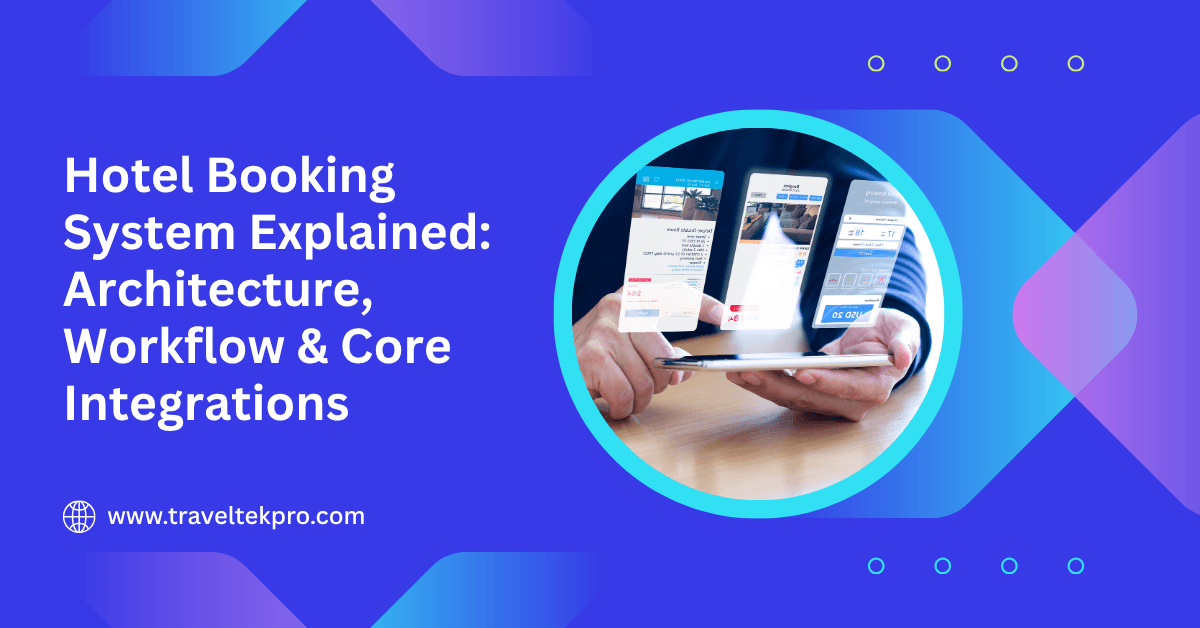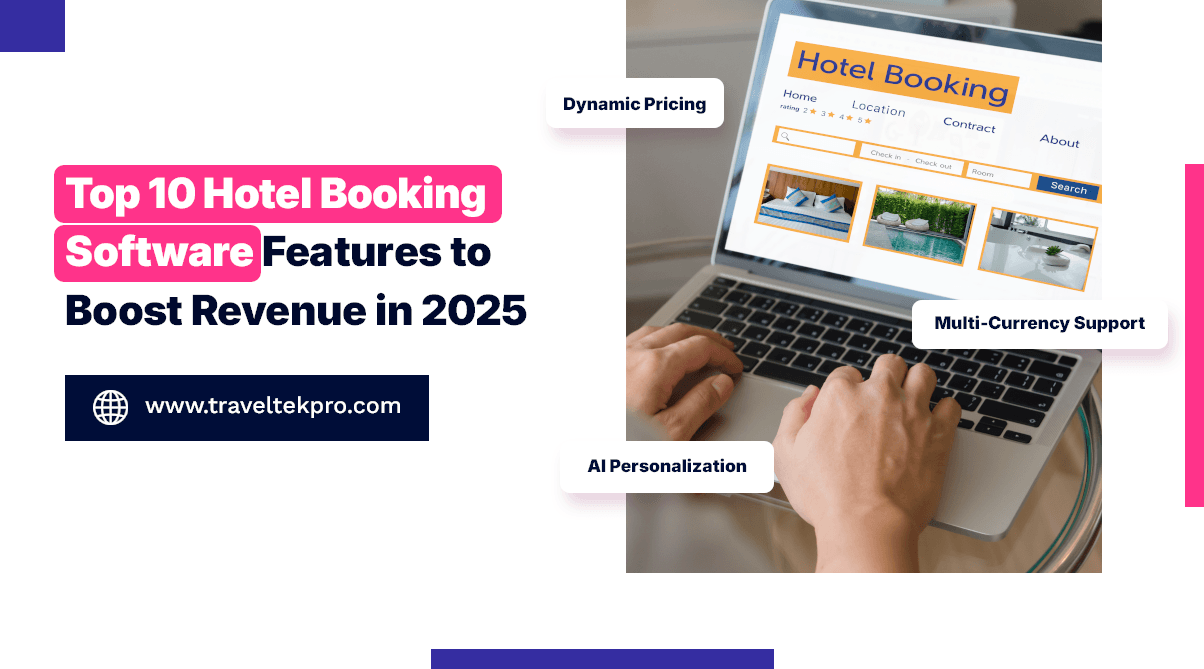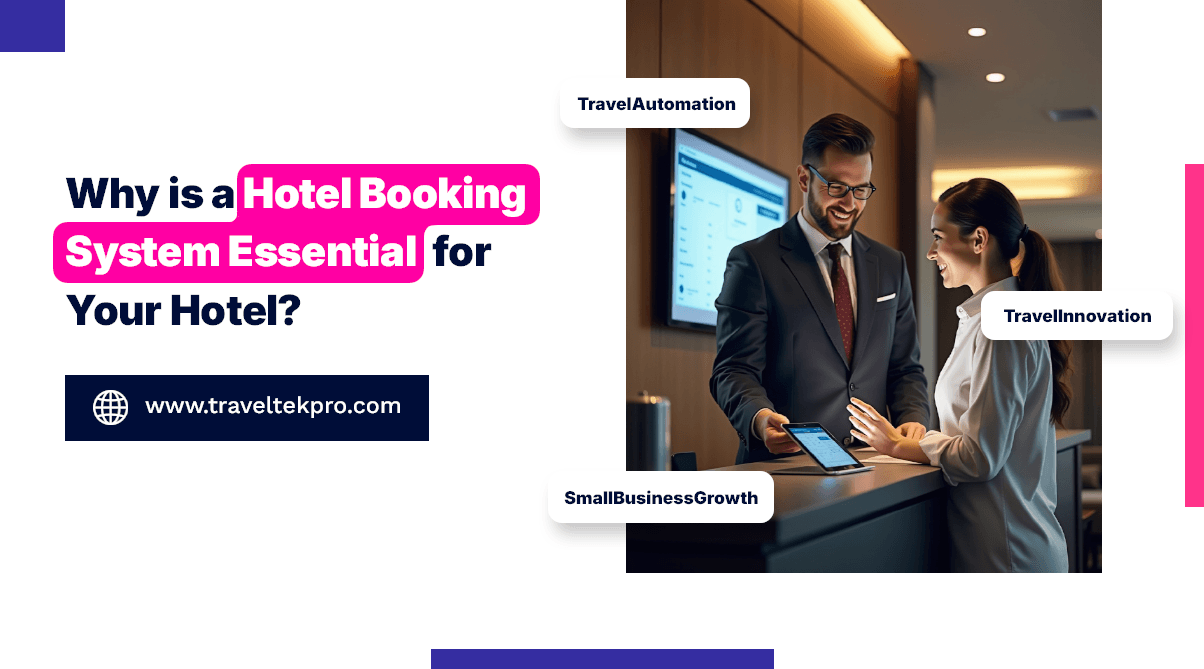Hotel Booking System Explained: Architecture, Workflow & Core Integrations
Just imagine that you want to book a hotel room for your next vacation. You pick up your phone, open a hotel app or a website, enter your dates and preferences and instantly see available room prices and reviews. A few tabs later you complete your booking and get instant confirmation all without calling anyone or waiting. This effortless booking experience is powered by a hotel booking engine . Behind the scenes the system handles millions of real time searches, manages inventory process payments and keeps the customer data safe all simultaneously.
In 2025 with rising traveler expectations of a faster and reliable hotel booking system is truly no longer just nice to have. It’s very important for hotels and travel platforms that want to succeed. Whether you are a developer or a business stakeholder, understanding how a hotel booking system actually works can help you make better decisions.
What is the hotel booking system?
Firstly you need to know that Hotel Booking Software enables your customers to search, select and book hotel rooms online. But it is much more than just a digital form where you input your travel dates and hit the book button.
Read More: What is a Hotel Booking Engine and How Does It Work?
How is it different from a generic hotel website?
A lot of hotels still have websites that list rooms amenities and photos but don’t allow online booking or offer real time availability. Guests must call or e-mail to reserve a room which slows down the process and can lead to errors or double bookings. A hotel booking system connects directly to the internal systems of the hotel or third party suppliers to provide you real time online availability, dynamic pricing based on demand, instant booking confirmation and secure online payment options.
Why does this even matter?
Without a proper hotel booking system your guests can just face a lot of delay and confusion . What experience for this job as a hotel you might risk revenue loss and face operational headaches. A dedicated booking engine solves all the issues by automating the process and providing seamless integration across multiple platforms.
High level architecture the building blocks of a hotel booking system
To build a strong hotel booking engine the architecture must be thoughtfully designed. You can think of it like layers of cake where each layer serves a specific purpose but works together to create the whole experience.
Front end layer
This is the visible part of the hotel booking system that travelers use to search and book hotels. It includes websites, mobile apps, chat bots and voice assistants. The front end focuses on user friendly design, fast loading and easy navigation. Features include search bars, calendar sectors, room listings with photos, amenities , user reviews and secure payment forms.
API layer or middle layer
This layer works like the brain’s messenger. It connects at the front end with external suppliers like global distribution systems like Amadeus, online travel agencies like Expedia and direct hotel property management systems. Every supplier has its own data format and communication protocols. The middleware normalizes this information into consistent structure and handles the routing of requests and respons. It also manages inventory deduplication and rate mapping.
Business logic layer
This is a systems brain. It contains all the algorithms and rules that decide which hotels and rooms to show based on the user input on how to upload dynamic pricing and discounts and how to handle booking limits and overbooking intervention. This layer also manages error handling and fullback processes.
Data layer
The database stores all the data required by the system including room inventory and availability calendar pricing rules and rate plans booking records and history customer profiles and preferences. This data as we secure consistent and scalable to handle millions of users.
Payment and security layer
As payments include sensitive financial data this layer ensures secure payment processing through the trusted gateways encryption of payment and personal data compliance with all the standards and fraud detection and prevention.
Core workflow and data flow
The step by step flow of Hotel Booking Software.
Step 1. Guest search
The user enters the destination check in and check out dates, number of guests and any preferences on the front end.
Step 2. API request sent to the suppliers
The middleware sends simultaneous requests to multiple suppliers to fetch available rooms and prices.
Step 3. response normalization and deduplication
As each supplier returns data differently than the system normalizes the data into a standard format. It also deduplicates inventory so that the same room is not shown multiple times if listed by several suppliers.
Step 4. display search results
The front end presents a sorted list of hotels with room rates, prices , photos , ratings and policies.
Step 5. user selects the rooms and initiate booking
The guest can select a room , enter personal and payment details and confirm.
Step 6. payment processing
The payment gateway encrypts the data and processes the payment. If successful a booking ID is generated.
Step 7. booking confirmation and inventory update
The system confirms the booking with the hotel’s PMS and updates inventory in real time across all the connected channels.
Step 8. Booking Cancel or Modify
guests can modify or cancel the bookings online. Syncs change with all the suppliers and update availability instantly.
Step 9. Handling errors
If a room sells out before payment completes or payment fails, the system shows friendly error messages and suggests alternatives.
Key function modules explained
Search and availability engine
The module takes your query and runs complex searches through millions of records to find matching hotels with available rooms. It applies filters and preferences and ensures only bookable options are displayed.
Booking manager
It manages the entire lifecycle of a booking like new reservations modifications, cancellation and refunds besides communicating status updates to hotels.
Rate rules and dynamic pricing support
Hotels change prices frequently based on the demand event seasons and even competitor pricing. Most of the system applies early bird or last minute discounts and weekend or holiday rates. These challenging roles are managed automatically.
CMS for localized content
The hotels serve guests globally so that the CMS supports multiple languages and currencies localized room descriptions and policy terms.
Architecture best practices for scalability and reliability
Building a strong hotel booking system means following some industry best practices.
1. Microservices and Modular Design
Instead of just building one large application, it’s very smart for you to break it into smaller independent services that can talk to each other through APIs. This approach makes it easier for you to scale update and fix issues as they just arise.
2. Smart Caching and Queuing
When it comes to reducing pressure on databases popular searches can be stored temporarily , by using background queues the system can help you handle a large number of booking requests perfectly without impacting your user experience.
3. Load balancing
Distribute traffic evenly across different servers to prevent Downtime and overload.
4. Headline CMS for content
Separating content management from the front end enables multi language support and easier content updates without you having to interrupt as a developer.
5. Security and compliance
Just because hotel booking includes personal and financial information, strong security is very important.
6. Payment gateway encryption
You need to ensure that all the payments go through the compliant gateways that encrypt the card data.
7. GDPR compliance
Your users need to give clear consent before data collection. The personal information is stored and processed lawfully.
8. API key management and audit logs
APIs are secured with keys and tokens, all access and changes are logged for accountability.
9. Fraud detection
Some systems monitor for suspicious bookings or payment patterns.
10. Regular security audits
You need to fix vulnerabilities and identify in time.
Tech Stack Examples & Real-World Architecture
| Layer | Example Technologies |
| Frontend | React, Angular, Vue, Flutter (mobile) |
| Middleware / API Layer | Node.js, Express, GraphQL, REST APIs |
| Business Logic Layer | Python (Django/Flask), Java, Go |
| Data Layer | PostgreSQL, MongoDB, Redis (caching) |
| Payment Layer | Stripe, Razorpay, PayPal |
| CMS | Contentful, Strapi, Sanity (headless CMS) |
| Hosting & Infrastructure | AWS, Google Cloud, Azure, Kubernetes |
Booking.com uses microservice architecture combining powerful search algorithms and multiple supply integration . They also invest in AI for customized recommendations and dynamic pricing.
Future and emerging integrations and hotel booking systems
The hotel booking system of tomorrow will be even smarter and more connected. You can expect customized recommendations for price forecasting chatbots for instant customer service. Booking hotels via Google Assistant is possible for hands free convenience now. Secure transparent loyalty programs and automated payments can also be possible in future with blockchain and smart contracts.
So in short you can say that a modern hotel booking engine is much more than just a booking platform; it’s a complex multilayered platform connecting guests, hotel suppliers and payment gateways in real time. By combining a strong front end, a powerful middleware layer and a smart business logic secure payment processing as a hotel you can deliver fast, accurate and customized booking experiences.
Read More: B2B vs. B2C Hotel Booking Systems: What’s Best for You?
FAQ’S
1. What makes a hotel booking engine different from a standard hotel website?
A hotel booking engine integrates real-time data from hotel systems or third-party suppliers, enabling instant room availability, dynamic pricing, instant booking confirmation, and secure payment all without delays whereas typical hotel websites display static information and require phone or email reservations.
2. How does middleware layer help in hotel booking systems?
The middleware layer normalizes data from multiple suppliers (like GDS, hotel PMS, OTAs), deduplicates inventory, handles rate mapping, and ensures that the front-end receives seamless, consistent information across different sources essential for accurate and reliable booking experiences.
3. Why is microservices architecture ideal for hotel booking systems?
Microservices architecture allows independent scaling and maintenance of components such as search, inventory, booking, payment, and content management delivering better performance, faster updates, and higher fault tolerance compared to monolithic systems under high traffic conditions.
4. What role does smart caching and queuing play in booking performance?
Smart caching stores popular searches temporarily to reduce repeated API calls to suppliers, while queuing handles multiple booking requests efficiently. This combination speeds up response times and prevents server overload during peak booking traffic.
5. How do hotel booking systems ensure secure payments and compliance?
These systems integrate trusted payment gateways (Stripe, Razorpay, PayPal), encrypt sensitive data, enforce PCI and GDPR compliance, and implement fraud detection and audit logs to keep transactions and customer data secure and compliant with global regulations.
6. Can hotel booking engines support future features like AI recommendations or voice search?
Absolutely modern systems support integrations such as AI-based price forecasting, chatbot assistants, voice booking through smart devices, and blockchain-based loyalty programs, making them easily extensible to include emerging travel technologies.
Let's Start Your Project
Let us help you achieve your goals, by creating the best solution for you!




